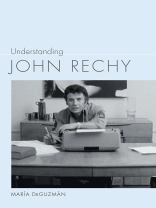In this first book-length monograph on the Mexican American novelist, essayist, and playwright John Rechy, best known for his debut novel City of Night, María De Guzmán offers a conceptually clear yet aesthetically, philosophically, and socio-politically fine-grained analysis of the spectrum of his writing. Recipient of PEN Center USA’s Lifetime Achievement Award, a National Endowment for the Arts Grant, ONE Magazine’s National Gay and Lesbian Cultural Hero Award, the William Whitehead Award for Lifetime Achievement, the Luis Leal Award for Excellence in Chicano/Latino Literature, and the Robert Kirsch Award for Lifetime Achievement, Rechy is the author of fifteen novels, at least three plays, and several volumes of nonfiction. He has written for the Nation, the New York Review of Books, the Los Angeles Times, the Village Voice, the New York Times, and Saturday Review.
In Understanding John Rechy, María De Guzmán offers a brief biographical overview and then traces the development of Rechy’s craft through his major works by calling attention to central issues, recurring situations and characters, styles, and special techniques. She examines the complexities of his representation of identity, the subjectivity in his male homosexual odyssey and identity quest novels, and his experimentation with genre. She offers a concise yet intricate analysis of the major organizing paradigms and themes, genres, modes, styles, and handling of the gay Chicano’s oeuvre. The book’s guiding analysis pays particular attention to the ways in which Rechy’s works function as cultural critique challenging mainstream values in a deep-structure manner.
Over de auteur
María De Guzmán is professor of English and comparative literature and founding director of the UNC Latina/o Studies Program at the University of North Carolina at Chapel Hill. She is the author of Spain’s Long Shadow: The Black Legend, Off-Whiteness, and Anglo-American Empire and Buenas Noches, American Culture: Latina/o Aesthetics of Night, as well as many essays and articles on Latina/o cultural production.












